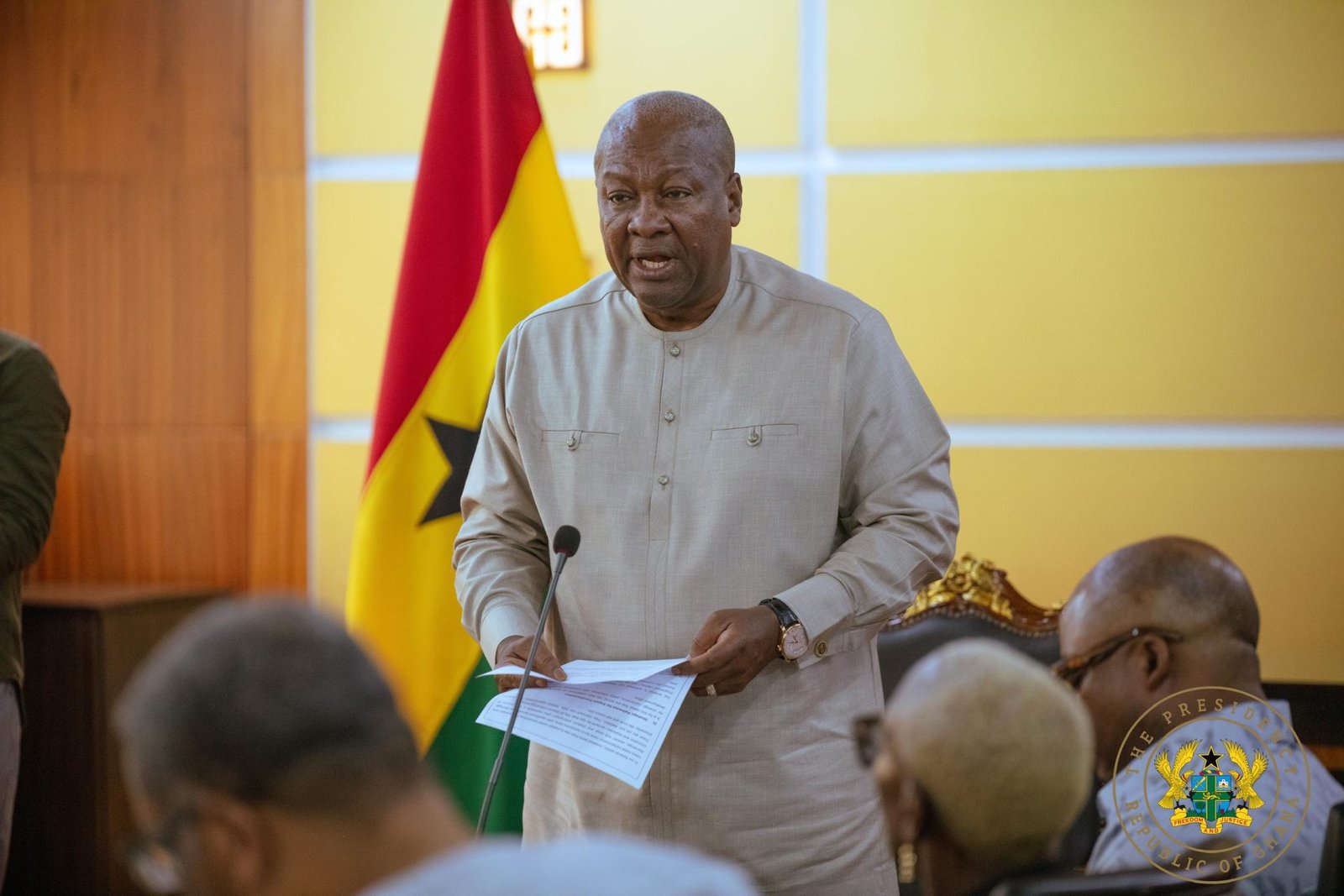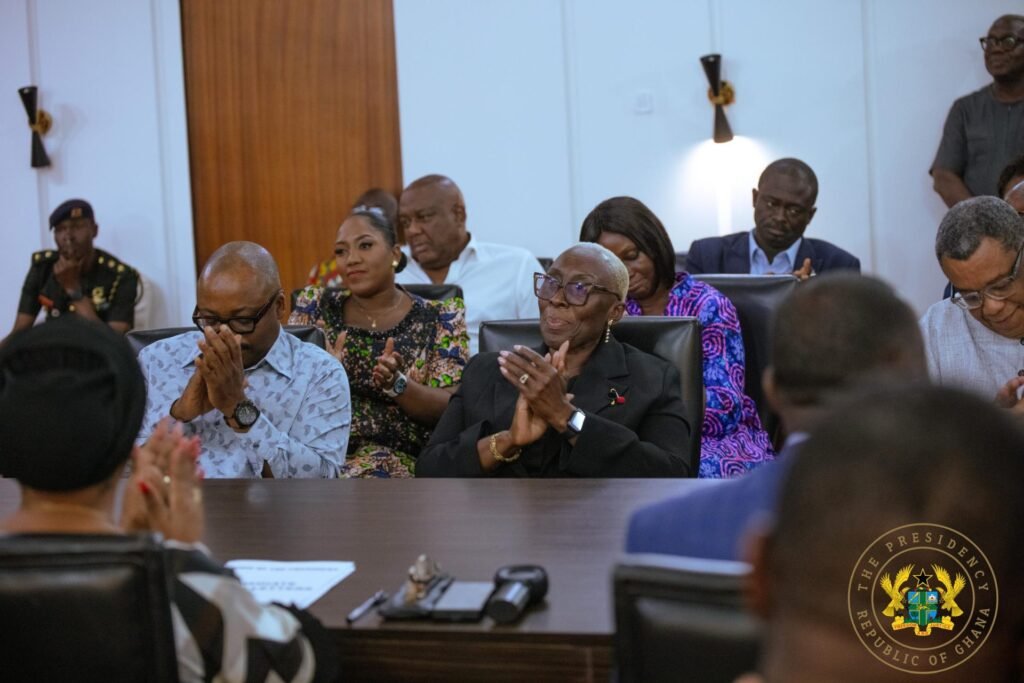News
President Mahama leads initiative to transform Ghana into an export-driven economy

President John Dramani Mahama has inaugurated an Accelerated Export Development Advisory Committee, a strategic initiative to propel Ghana towards becoming a leading export-driven economy.
The 19-member committee, chaired by the President himself, will lead the implementation of the 24-Hour Economy policy, prioritising value addition and economic diversification through strong partnerships with the private sector, particularly in agro-processing and light manufacturing.
President Mahama, an advocate for job creation and national development under his #ResettingGhana agenda, emphasised the critical role of the Committee in achieving ambitious economic goals.
“Through targeted incentives and strategic partnerships, we will scale up local production and participation in the value chain,” Mahama stated during the inauguration.
He noted that “Our 24-hour economy strategy will complement this ambition by developing focused value chains including cassava, tomato, palm oil, pharmaceuticals, textiles and garments, and industrial machinery.”
The President expressed confidence that implementing the export development strategies would lower the national unemployment rate from 14.7% to below 5% by 2034.
To facilitate efficient export operations, the government will invest heavily in modernising critical infrastructure, including upgrading and expanding ports, revitalising the Volta Lake Transport Company, developing the Mpakadan Port, operationalising the Boankra Inland Port, and expanding cold chain infrastructure to support the fisheries and horticultural sectors.
The Accelerated Export Development Programme and the National Export Development Strategy are central to achieving these goals.
“We aim to grow Ghana’s non-traditional export earnings from $3.5 billion annually to at least $10 billion by 2030,” President Mahama affirmed.
The Accelerated Export Development Advisory Committee will foster close collaboration with the private sector, development partners, academia, and regional institutions to address export barriers, identify emerging opportunities, and drive coordinated reforms.
The Committee will be supported by the 24-hour economy secretariat, the Ghana Export Promotion Authority (GEPA), the Ministry of Trade and Industry, and other relevant agencies to ensure a seamless transition from strategic planning to tangible results.
MEMBERSHIP OF THE ACCELERATED EXPORT DEVELOPMENT ADVISORY COMMITTEE
1. HE John Dramani Mahama
2. Mr Goosie Tanoh
3. Hon. Dr Cassiel Ato Forson (MP)
4. Hon. Elizabeth Ofosu Agyare (MP)
5. Hon. Emelia Arthur (MP)
6. Hon. Eric Opoku (MP)
7. Hon. Dominic Ayine (MP)
8. Mr Anthony K. Sarpong
9. Professor John Gatsi
10. Brigadier General Paul Seidu Tanye-Kulono
11. Gerald Nrako Mensah
12. Dr Akushika Andoh
13. Dr Eben Anuwa-Amarh
14. Kwesi Korboe
15. Sampson Asaki Awingobit
16. Jacob Ainoo Ansah
17. Gabriel Opoku Asare
18. Gerald Nyarko Mensah
19. Davies Narh Korboe
News
Prioritise affordable treatment of sickle cell treatment —Health Expert

Health experts have urged Ghana to prioritise affordable and accessible treatment for sickle cell disease (SCD) as advanced, but costly curative therapies remain out of reach.
SCD, an inherited blood disorder, affects about three in every 100 newborns in Ghana.
Globally, around 1,000 babies are born with the condition daily, with three-quarters in sub-Saharan Africa.
The disease causes severe complications including chronic pain, anaemia, infections, strokes and organ damage, often leading to shortened life expectancy.
In recent years, gene therapy has been developed as a potential cure.
However, its cost—running into millions of dollars per patient—makes it financially and technically inaccessible in Ghana.
According to Dr Lawrence Osei-Tutu, a Sickle Cell and Childhood Cancer Expert at the Komfo Anokye Teaching Hospital, “the country must instead focus on practical, lower-cost interventions such as hydroxyurea”, a decades-old cancer drug proven to reduce painful episodes, hospitalisation and life- threatening complications in SCD patients”.
Taken orally, the medicine improves red blood cell function and is considered safe and effective.
“Hydroxyurea therapy is as good as the cure and a low-hanging fruit to pluck, we must bring a cure to our sickle cell warriors, but do so sustainably.” he urged.
In a chat with The Spectator here, he said to create awareness on the disease, the expert noted that despite its benefits, “hydroxyurea is not widely accessible in Ghana.”
Stressing that, “many patients either cannot afford it or struggle with irregular supply through the health system.”
Moreover, he argued that scaling up access would provide immediate relief while the country builds the infrastructure, trains specialists and secures funding needed to support curative therapies in the future.
With an estimated 15,000 babies born with sickle cell disease annually in Ghana, Dr Osei Tutu cautioned that “failure to improve access to effective treatment will leave many patients vulnerable to preventable complications and early death.”
From Kingsley E. Hope, Kumasi
Join our WhatsApp Channel now!
https://whatsapp.com/channel/0029VbBElzjInlqHhl1aTU27
Hot!
Let’s reintroduce Cultural Studies to complement educational reforms — Tourism Minister

Madam Abla Dzifa Gomashie, the Minister of Tourism, Culture and Creative Arts, has emphasised the importance of reintroducing Cultural Studies in schools as part of Ghana’s broader educational reform agenda.
She said Cultural Studies would complement existing efforts to reposition Science, Technology, Engineering and Mathematics (STEM) and Technical Vocational Education and Training (TVET) to promote digital literacy and expand Creative Arts education.
Speaking at the 2025 Homowo Festival of the people of Ningo-Prampram, held on the theme: “Education: The Best Legacy for our Children,” Madam Gomashie said cultural education was critical to national identity and development.
She noted that the festival’s theme aligned with the Government’s vision to transform education in Ghana and encouraged the youth to embrace it not only as a means of personal development but also as a way of preserving traditional values.
These values, including patience, wisdom, and hard work, were at the core of the Homowo celebration, the Minister said.
“Cultural festivals like Homowo are vital instruments for strengthening cultural identity, preserving historical memory, and fostering national unity. Additionally, festivals serve as platforms for educating the youth through storytelling, music, dance, and other traditional practices, while also providing opportunities for community engagement.”
Madam Gomashie highlighted the strong foundation that Ghana’s tourism was built on, which included culture, traditions, and the creative industry, collectively contributing to over GH¢4.8 billion to the economy.
“Festivals give tourists reasons to visit our country. Therefore, with the right infrastructure and the development of all the domains, the sector can do more than what has been recorded,” she added.
Mr Sam Nartey George, the Member of Parliament for Ningo-Prampram and Minister of Communication, Digital Technology and Innovation, commended the community for their vibrant participation in the festival. He announced plans for the construction of a new nursing training school in Ningo, aimed at expanding access to healthcare education in the area.
Nene Osroagbo Djangmah XII, Paramount Chief of Great Ningo Traditional Area; King Dr Tackie Teiko Tsuru II, Ga Mantse; Nene Tetteh Wakah III, Paramount Chief of the Prampram Traditional Area; Prof. Odaifio Welentsi III, Paramount Chief of the Nungua Traditional Area; Naana Dugbakuwor Dugba II, Paramount Queen Mother of Great Ningo; and Mr. Elvis Afriyie Ankrah, Special Envoy on Religion and Inter-Faith Affairs, who represented the Chief of Staff, were among dignitaries at the festival. -GNA














